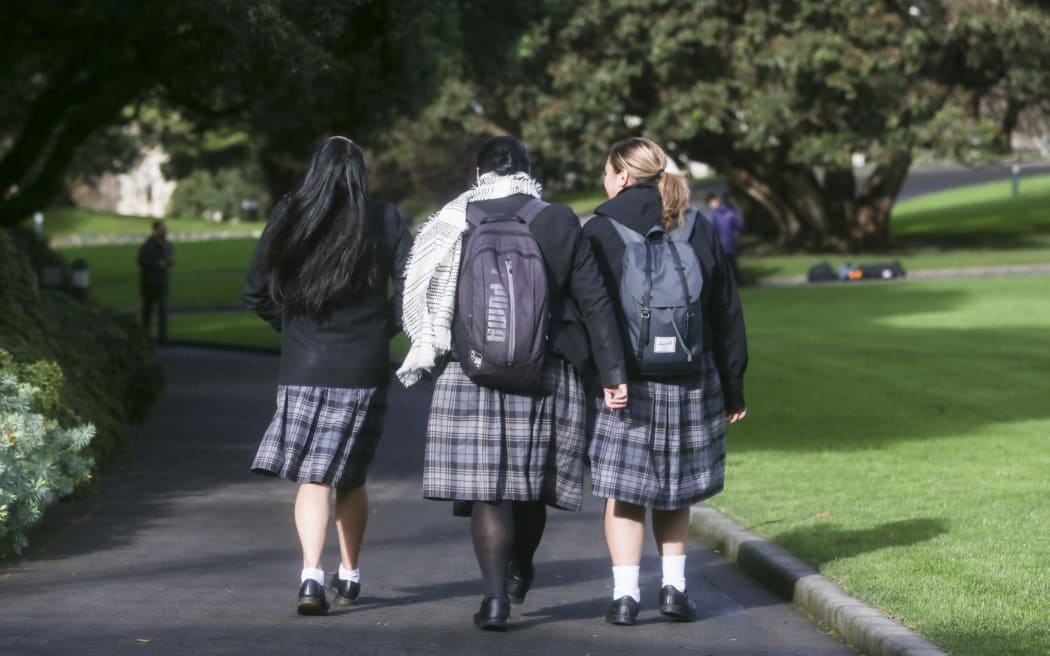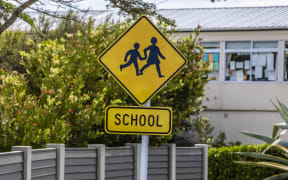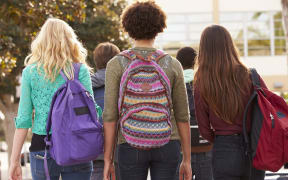
(file image) Photo: RNZ / Richard Tindiller
School children want good teachers, access to clubs and sports groups and not too much homework.
Some would also like more sleep.
More concerningly, many LGBTQIA students do not trust their schools with data about their identity and some worry they might be "outed" to their family.
The findings have emerged from an Education Ministry study involving nearly 10,000 school students from years 7-13 to inform new measures of student wellbeing.
Participants were asked 10 questions including how they wanted their school to show it cared for them, what made a safe school and what was important for students to learn successfully.
Analysis of the results found 20 commonly-cited themes starting with teachers.
"For ākonga, it was important that there were positive relationships between ākonga and a teacher or trusted adult at kura/school," the report titled 'understanding student wellbeing in the educational setting' said.
Time was the second-highest theme with students saying they needed a manageable school/life balance and time to complete schoolwork within and outside of school.
Students told researchers they wanted schools to be "more understanding about stress and not having time to finish things on time" and "longer deadlines so we don't get stressed".
They also said they wanted more breaks or down-time from learning.
Elsewhere, students said they wanted more subject options, less work and less homework.
Students also said they wanted clubs and activities to join in, and some wanted more fitness or sports.
Friends, the opportunity to focus quietly on their work, and consideration of students' feelings were the next most commonly-cited themes.
Students also asked for school rules to be rational and meaningful and to have a say in those rules.
"When something happens let students have a say," said one student.
"Being less strict on uniform rules so we can feel like ourselves," said another.
Other factors included kindness, less stress, free and healthy food and feeling included.
Students also cited sleep as a factor that affected their ability to learn.
One student asked for "starting later for more sleep" while another suggested "letting us sleep in class".
The report said Māori students were unique in expressing what the study summarised as Mana Motuhake - a sense of self-belief and perseverance.
"I kind of love the strict rules and how because we have high expectations, we are able to go out and that," said one student.
"I'm proud of the fact I've been almost always reaching the expectations. I am proud of the fact that I went from 13y in spelling age to 15y," said another.
Ākonga Māori also valued whānaungatanga and manaakitanga and the use of te reo Māori in class.
Nearly 20 percent of the respondents said they had a disability and while they expressed similar concerns to other students, they also cited a desire for independence and routine.
Fourteen percent of respondents identified as a part of the Rainbow community
"General comments we received from Rainbow-identified ākonga about data sharing reflected an overarching theme of distrust of their kura/school or teachers with their sensitive information," the report said.
"One ākonga wrote that their teachers do not always recognise the Rainbow community at kura/school, and another shared that they did not trust their kura/school not to 'out' them to their family."
One Rainbow student said: "Some schools are great, but our experience is that they aren't supportive." While another said: "students don't always trust their teachers with sensitive information".
Parents worried about student safety
The study also gathered the views of more than 15,000 parents and families.
It said students had a broader view of wellbeing than adults.
"The wellbeing of their rangatahi is clearly a priority for parents. Concern regarding mental health and the easy access to trained counsellors was repeatedly voiced," the study said.
"Mental health is huge; both my daughters suffer from mental health issues and anxiety so access to school counsellors would be amazing," a parent told the study.
"More counsellors (our school only has one counsellor for 900 students!)," said another.
The report said parents were worried about safety, including physical safety, and students being free to speak up and not feel ashamed.
"Schools are not safe for LGBT or disabled students to be themselves, only very rarely are they able to and this affects their learning in more ways than non-LGBT or non-disabled people can understand," a parent told the study.
Māori respondents wanted teachers to be culturally-responsive, have high expectations, and normalise te ao Māori in the classroom.
They also wanted more school counsellors and resources to help students deal with anxiety and stress.
Pacific groups wanted to see more Pacific teachers and celebration of Pacific culture.
The report said the Education Ministry made student wellbeing a priority, because of extensive feedback about the general wellbeing of students and indicators, such as falling student attendance and engagement rates.






